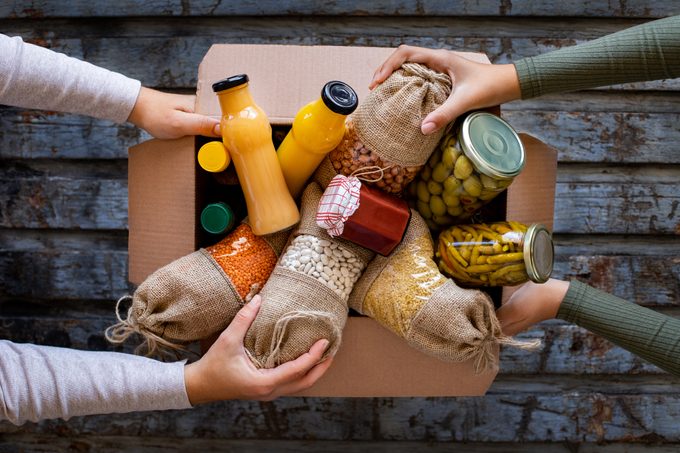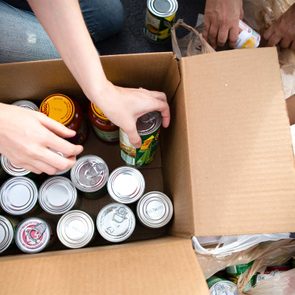16 Health-Focused Ways to Give Back This Holiday Season
Updated: Mar. 08, 2022
Here are ways to help others live better during the holidays—or in the new year—by contributing to organizations that benefit the environment and individuals who need greater access to nutrition, fitness, and mental health care.
How to give back
The holidays have a special way of sparking feelings of unity and kindness, so it’s no surprise that charitable acts and donations jump significantly during this season. Even Scrooge eventually found his holiday-giving spirit—and lately, giving has grown more popular than ever. In fact, GivingTuesday.org reports that donations increased nine percent on the Tuesday following Thanksgiving in the U.S. between 2020 and 2021. This also marked an impressive 37 percent increase since Giving Tuesday 2019, just before the pandemic began.
Whether it’s dropping your spare change in the red Salvation Army bucket, heading up a toy drive at the office, or working at the food bank, you might be looking for ways to spread some cheer by making a difference in someone’s life. Giving isn’t good only for the ones on the receiving end, but for you as well. Here’s why…along with some healthy, meaningful ways you can give to someone who needs it this holiday season.
Giving has mental and physical benefits
Helping someone else during the holidays—or, anytime—can help you feel better. That’s according to Jennifer S. Cheavens, PhD, a professor and the director of clinical training in the department of psychology at Ohio State University. “People who are more prosocial—giving, altruistic, cooperative—report having more meaning and purpose in their lives,” Dr. Cheavens explains. She adds that “doing good deeds is associated with increased happiness and life satisfaction.”
And, Dr. Cheavens adds, for those of us who are looking to boost our health however we can these days, research has found that giving to others is also associated with physical health, especially when it comes to buffering the effects of stress—something many of us are experiencing at heightened levels lately.
Turns out giving may also help us as we age, according to a study of older adults published in the Journals of Gerontology that found participants who reported giving more support to others also reported better physical health over time. A separate study published in The American Journal of Public Health found generosity may also extend our longevity: adults in this study who reported engaging in more helping behaviors saw a decreased risk of death within five years.
Of course there are plenty of reasons to give. However, you may find one challenge with being charitable is that it feels like there’s so much need out there—how do you narrow down whom you want to help? For the most impact, says Dr. Cheavens, it is “more important that you find ways to increase your connection to others and support your own values.”
To that end, start by thinking through these questions:
- What do you enjoy most? Giving back should involve some sacrifice—but one that inspires you, not that feels like a burden. Pick a way to help that you personally will enjoy.
- What resources can you spare? You can’t give what you don’t have, and overcommitting funds (or time) is a pretty sure way to dim your holiday spirit. Be honest about how much time, energy, and money you have to devote to a cause (or multiple causes).
- Why do you want to do this? While the spirit of giving is beautiful, toxic guilt culture isn’t. Be sure you’re doing something because you want to, not because you’ve been guilted or shamed into participating.
(By the way? We know the holidays can be overwhelming, especially after an intense year. Here’s how to ask for help during the holidays without feeling like a burden.)

How to donate without getting scammed: Safety first
Unfortunately, there are people out there who are looking to take advantage of generous people during the holidays. Charity scams can be quite common, especially online. So before committing to any charity or activity, ensure that it’s safe and legitimate. Check it out on Charity Navigator, a website that ranks philanthropic organizations based on their financial health, accountability, longevity, and transparency. (We actually saved you a step: all the charities listed below are rated 4/4 stars.)
If you’re keeping your gift local, consider checking out a charity in your area by talking with people you know who are involved, or even contacting the organization yourself, rather than going through a middleman or social media. Also, always be very wary of giving out personal information.
Health-centered ways to give back during the holidays
There are so many ways you can give. To help you narrow it down, we’ve categorized altruistic ideas into four healthy living categories: The environment, fitness, nutrition, and mental wellness.
Here are some ideas for things you can do to help someone else live a healthier, happier life. (We’ve also got a list of 14 places you can donate to fight racism and injustice.)
Ways to Help the Environment

Gift a carbon offset
Give loved ones a “carbon offset” voucher. CarbonFund.org allows you to purchase a gift card in a various amounts, so the giftee can select how many tons of carbon they’d like to help offset based on their daily activities.
If you don’t want to simply make a donation in a loved one’s name, you can give gifts that directly reduce their carbon footprint—for instance, offering to pick them up and carpool with them to work a couple of times a week. (Got Eco-Anxiety? Here’s How to Deal With Climate Despair.)
Fight climate change
You might agree that our wellness is intertwined with the health of the Earth, and we’re all seeing the effects of climate change on a personal and global level. Give back to the planet by donating your time and energy to a local group working to improve things in your area, or you can donate money to a climate-focused charity, like The Climate Reality Project.
Visit a Giving Machine
Giving Machines are like vending machines—except that when you insert money, instead of you getting a candy bar, someone else gets a tool to improve their lives.
Located in major cities around the U.S., the Giving Machines allow you to donate a warm blanket to a local shelter for a few bucks, a composting toilet to a city in the Amazon, or even a pig to a farmer in poverty.
It couldn’t be easier to give back—simply swipe your card, choose what you’d like to donate, and The Church of Jesus Christ of Latter-Day Saints covers all the costs and delivery.
Prepare for and help with natural disasters
Fires, tornadoes, severe storms, hurricanes, and earthquakes: As climate change increases, so will the rate of natural disasters. It’s possible your community is at risk for at least one type.
It may not seem like the “holiday spirit” at first, but one of the best gifts you can give your loved ones, neighbors, and community is to help people prepare for natural disasters in their area; or by helping with clean up and relief after a weather-related emergency happens.
It can be as simple as creating a neighborhood disaster plan or a phone tree. You can also donate to the Salvation Army Disaster Relief, one of the top charities providing help for natural disasters around the world.
Fitness

Start a neighborhood Santa run
Running should be fun! But registering for a race can mean a lot of logistics. Skip parking, registration fees, and long lines at outhouses by organizing a 5K Santa fun run around your neighborhood. Set a time, date, and route, and then share it by word-of-mouth or online.
Encourage people of all ages to dress up in their favorite Santa attire and run, walk, or bike the course together. Everyone has fun and gets exercise. For extra goodness, ask people to bring a can of food to donate to your local food bank.
If you’re looking to up your running game in the new year, check out The Only Question You Need to Ask to Find the Best Running Shoes.
Download a fitness charity app
Get a head start on your New Year’s health resolutions and help others with the app, Charity Miles. Pick a type of exercise and log your workouts in the app.
As you complete your workout goals, Charity Miles will donate a certain amount of money to a charity. You can choose from over 30 charity partners or get your employer or a loved one to sponsor you.
Fight homelessness with fitness
Looking for a running group and new friends? Back on My Feet is a charity centered on helping people out of homelessness by teaching them life skills, starting with healthy exercise habits. The organization also helps individuals find jobs and housing. You can make a cash donation, or if you live in one of the 15 cities where they operate, show up for a group run and volunteer your time and skills.
Get girls into running
Body image, self-esteem, or other concerns sometimes get in the way of a young girl’s interest in participating in athletics or other physical activities that can foster exercise habits to stay healthy later in life. If you’re invested in seeing this generation of young women grow strong, confident, and active, consider donating to Girls on the Run—a charity that organizes fitness groups for girls with a focus on personal empowerment, nutrition education, and creating a future for healthy living. (If you’re really inspired, you can also coach a Girls on the Run group.)
Nutrition

Organize a food bank collection with a focus on healthy donations
Food insecurity is a national issue that’s grown more severe during the pandemic. If you’d like to contribute, consider calling your intended food bank first and check to see what they are most in need of this season.
Many food banks need healthy, shelf-stable nutrition essentials, particularly foods high in protein. Though, you may consider forgoing the dried beans (things like this can be difficult to cook for an individual or family who doesn’t have a full kitchen). Instead, think more “grab-and-go”—donate items like canned tuna or chicken, beef jerky, meat sticks, and protein bars or shakes.
Teach someone how to garden
If you have a green thumb, you know growing fresh fruits, vegetables, and herbs boosts nutrition, teaches a life skill, and provides great health benefits. Think about sharing your know-how by volunteering at a local community garden, or teaching children how to garden by volunteering with a local school. (Just keep in mind, working with any organization for children is likely to require clearances.)
If you’d like to share your love of nutrition but are short on time, you can donate to the Edible Schoolyard Project, a charity that partners schools with master gardeners and provides supplies for kids to learn how to grow food.
Donate 10 meals to the hungry
If you’re looking to broaden the reach of your giving, Feed America will allow you to purchase a food voucher, to donate yourself or to give as a gift in a loved one’s name. The voucher provides 10 healthy meals to someone who is food insecure.
Supply nutritious food to starving children
Feed My Starving Children is a charity devoted to ending childhood hunger around the world. They’ve developed nutritionally complete meals that provide essential nutrients that underserved children often miss out on.
This helps fill kids’ bellies, as well as better enables them to avoid illness and the long-term health complications of malnutrition. You can volunteer by packing meals in one of Feed My Starving Children’s facilities (including their mobile trucks) or by donating funds toward their cause.
Mental Health

Listen
Especially when things in the world seem more uncertain or unstable than ever, you don’t have to be a professional therapist to provide hope, healing, and a genuine human connection to people suffering from anxiety, depression, or other mental illness.
Call a loved one who may be lonely, volunteer at a community mental health center, or, which may be most feasible when person-to-person contact is limited, offer to field calls for a crisis line. And for your caring heart, check out 16 Caregiver Quotes for Inspiration and Encouragement.
Play a part in suicide prevention
The American Foundation for Suicide Prevention has stated that in 2019, suicide was the 10th-leading cause of death in the United States, with a reported 54 percent of Americans having been affected by suicide in some way. The Covid-19 pandemic has only driven that trend to grow greater, with young people and healthcare professionals dying by suicide at unprecedented rates. Help combat this by volunteering with the American Foundation for Suicide Prevention.
The AFSP offers several different ways you can help locally or nationally. Just a couple ideas are to help children and teens by checking with your local school district about volunteer mentoring programs, or teaching suicide prevention workshops.
Help out a service member
People in the military, and their families, are at a higher risk than the general population for domestic violence, self-harm, suicide, PTSD, and mental illness. If you’ve served in the military or loved someone who has, a beautiful way to give back is to look after current service members’ health and wellbeing.
Offer your time with a local veterans’ group or donate to Project Sanctuary, a non-profit that provides counseling and mental health support to military members and families. (Also learn more about why childhood trauma puts individuals at greater risk for PTSD.)
Fight substance abuse
The National Institute on Alcohol Abuse and Alcoholism notes that the holidays are a time of year when individuals with a drinking or drug problem are more likely to consume beyond their limits. The National Center on Addiction and Substance Abuse offers many ways to help, including monetary donations, but one particularly meaningful way is as a parent coach volunteer.
Many parents suffer greatly while trying to help a child deal with addiction, feeling isolated and scared. Your time, sympathy, and a listening ear can be an immense gift—especially if you’ve experienced similar struggles in your own life.
















